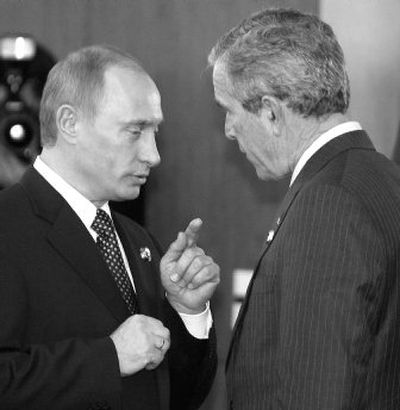Bush invites Putin to family compound

WASHINGTON – President Bush on Wednesday launched a high-stakes effort to repair the dramatically deteriorating U.S. relationship with Russia by inviting President Vladimir Putin to visit the family compound in Kennebunkport, Maine, after weeks of rhetoric reminiscent of the Cold War.
The White House has grown increasingly alarmed lately with the harsh tone coming out of Moscow and its hardening positions on sensitive issues. Administration officials said privately that the situation has reached a crisis stage and needs to be reversed.
Although the president’s aides do not expect to resolve the stickiest issues during the visit to the Bush family retreat July 1 to 2, they hope the relaxed setting will restore a constructive footing to U.S.-Russian relations. During more than six years as president, Bush has never asked any foreign leader to join him at his parents’ seaside home until now, and aides hope Putin will be impressed with the show of intimacy.
“The Russians still remain a very important partner, despite the tensions that may arise over various issues,” White House press secretary Tony Snow told reporters after announcing the meeting Wednesday. “We’re going to make all our concerns known, but on the other hand, we’re going to continue working to work ahead.”
But Russia specialists expressed doubt that Bush can make much headway with Putin, particularly now that both are heading into the twilight of their tenures. Putin has said he will step down next spring in accordance with constitutional term limits, just months before Bush’s successor is chosen in U.S. elections.
“This is a relationship that’s been taking one body blow after another,” said Stephen Sestanovich, who was ambassador to former Soviet republics under President Clinton. “It’s very hard to put something like that back together when both leaders are deep into lame-duck status.”
The two sides are at loggerheads over several issues. Bush wants Russia to do more to pressure Iran to give up its nuclear program, while Moscow resents U.S. plans to deploy missile defense systems in Eastern Europe. The two sides disagree over whether Kosovo, the southern province of Serbia that has been under U.N. administration since a 1999 war, should be allowed independence.
But more disturbing to U.S. officials has been the tenor of the Russian response to these disputes. Putin recently compared U.S. policy to that of the Third Reich and suspended implementation of a major arms control treaty to protest U.S. missile defense. Just this week, he accused the United States of turning Europe into a “powder keg” and his government announced it has tested a new missile that could penetrate any U.S. anti-missile shield.
Bush administration officials said the Putin visit came about because he was already planning to travel to Guatemala in a month. Some hold out hope that the two may be able to sign a civil nuclear cooperation agreement, but as one official put it, “I don’t think we’re holding our breath.”